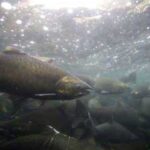
With the Copper River salmon fishery in Prince William Sound just weeks away and the Bristol Bay salmon fishery coming up in June, plans are still in flux on how to ensure the safety of harvesters, processors and communities in the midst of a pandemic.
To date the areas of the Cordova based fishery and the Bristol Bay region have eluded the spread of the novel coronavirus, and they want to keep it that way. Most communities already have 14-day quarantine requirements in place, as well as restrictions on unnecessary travel.
The city of Cordova, Alaska, has posted a strict set of rules at https://covid19.cityofcordova.net, dictating protocols for everyone, including residents and visitors, to keep the virus at bay. All fishermen and other businesses are required to notify the harbormaster upon their arrival and to immediately isolate, abiding by traveler quarantine requirements. They must also complete a vessel/business assessment form for all employees and file a mutual aid agreement within 72 hours of arrival.
A detailed Covid-19 specific harbor operations plan is in place. The city has volunteers ready to make sure everyone arriving at the harbor or city airport knows the rules and fills out required travel forms. Cordova Mayor Clay Koplin said they don’t want to harass anyone, but they want the tools in place to be used to keep their community safe.
Meanwhile in Dillingham, the Bristol Bay Working Group – representing economic, health, housing and tribal entities – has told state officials what they consider minimally acceptable protocols to protect those engaged in the fisheries and residents from the virus. The protocols, outlined in a letter to the state, range from pre-screenings of those coming to the Bay for the fisheries to weekly health screenings once they arrive.
The working group’s concern is that the fishery attracts people from many areas where thousands of people have already been infected by COVID -19, and the Bristol Bay region is ill-equipped medically to deal with it. They also remember how the Spanish flu pandemic of 1918-1919 killed a high percentage of the adult population, leaving hundreds of children as orphans.
Veteran fishermen like Robert Heyano say if the fishery happens they will be out there fishing, but they want the fishery conducted in a safe manner. Heyano said that if everyone focuses their energy on the safest practices and protocols are in place, it will go a long way toward making the fishery a safe one.
To date each of the participating processors has presented its own plan for safe conduct of the fishery. Some of these plans include pre-isolating workers before bringing them to the Bay and protocols to restrict workers to travel between bunkhouses and processing facilities only. Several Bristol Bay harvesters from Kodiak plan to pre-quarantine themselves and crews before leaving Kodiak, and remain on board for the duration of the fishery. If all the incoming harvesters would do that, Dillingham leaders said, it would give them more assurance of a safe fishery.
Fishermen’s News Online grants permission to the Alaska Native News to post selected articles. Read More at: Fishermen’s News Online.

